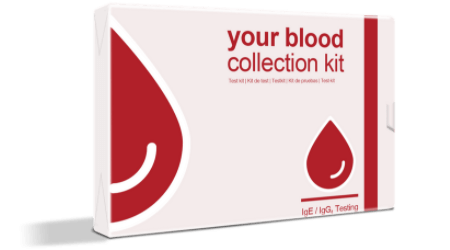If you think you might have an allergy, it is best to order an allergy kit online and get it delivered to your doorstep. An allergy kit will help you determine what you are allergic to,for you to start eliminating the foods or avoiding environmental factors that will cause an allergic reaction.
You can have your kit delivered to you from Allergy Test Australia if you are in Australia. You will then put your blood sample, fill in your medical history, and send it back to the allergy lab and get your results via email within a week.
An allergic reaction is how your body reacts to substances it views as harmful. These substances the body finds to be “harmful” are called allergens. Allergens could be normal things such as food, pet dander, or even pollen. When your body thinks something might be harmful to the immune system, it fights it, resulting in symptoms that we see as allergic reactions.
When determining whether you have an allergic reaction, it is best to know the symptoms.
Symptoms of an allergy
There are so many symptoms that could mean you have an allergy. These symptoms vary depending on the allergen your body is fighting off.
Seasonal allergies (these mostly mimic symptoms of a cold)
- Running nose
- Congestion
- Coughing

Fatigue could be a symptom of an Allergy
Food allergies (1) affect the skin, cardiovascular system, gastrointestinal, and respiratory tracts.
- Fatigue
- Swelling
- Nausea
- Hives
It can take a while to know if you have a food allergy hence why it is better to have an allergy test to determine which foods could be causing the problem.
Severe allergies cause anaphylaxis, which can result in symptoms like;
- Lightheadedness
- Breathing difficulties
- Loss of consciousness
How to prevent allergy symptoms
There is no sure way of avoiding the symptoms of allergies, but you avoid such by getting a proper allergy test which will help you know which foods you should not consume. When shopping, ensure you check the ingredient list to avoid eating a food you are allergic to. When dining at a restaurant, it is better to ask questions to avoid consuming foods that could bring about allergic reactions.
When it comes to contact allergies, the best you can do is avoid all that could cause these reactions. With seasonal allergies, ensure you know where or when they may occur and keep safe. For example, when it’s summer, and you can see flowers and trees blooming, it is best to put on a mask to avoid being in contact with pollen if you’re allergic to them.
Also, if you are allergic to dust, install air filters and have your ducts regularly cleaned by a professional to keep the house dust-free. When you do that, you won’t have allergic reactions that you dread most of the time.
How can I test myself for allergies?
At-home allergy kits are a convenient way for you to check for your allergies without having to go through multiple routine checks at your doctor’s office. These kits are available in pharmacies and for sale online. At-home allergy kits test for major allergens that you might have and help you narrow down to the allergy causing you dire symptoms.
At-home allergy kits check for immunoglobulin G (Ig4),(2) an antibody your immune system produces to fight certain allergies or sensitivity. Once you have had your results from the allergy lab, it is best to visit your doctor and get a way forward on what you can do. But the test will show you what you are allergic to to avoid it.
To get a test;
- Order your kit online.
- Wait for its arrival, which could take around three days to arrive in your mail.
- Read the instructions on the kit, which should take around five minutes.
- Once you have taken your sample, send it out to your lab.
- You will then receive an email with your results.
Common allergens
Researchers have no idea why people have allergic reactions to foreign substances. Allergies can be passed down in the family. For example, a mother could have an allergic reaction to pollen, which means the kid might also get allergic reactions but not specifically to pollen.
The most common types of allergens include;
- Drugs: Penicillin and sulfa drugs.
- Mold
- Animal products: Pet dander, cockroaches, and dust mite waste.
- Foods: Wheat, milk, nuts, shellfish, and eggs.
- Stings from insects: Mosquitoes, wasps, and bees.
- Plants: Pollen from grass, trees, and weeds. Also, resin from poison ivy and poison oak.
- Others: Latex (found in gloves and condoms) and metals (like nickel).
Conclusion
Most allergies are manageable, and one can live with them through an elimination diet, medication, and lifestyle changes. Once you have tested for allergies, you can now comfortably discuss a way forward with your doctor so you can keep living a quality life. With the right treatment method, you could eventually eliminate the allergy.
You can get yourself an allergy test kit online that will test for antibodies in your blood to help determine your allergens. Study (3) shows a rise in food allergies as people grow older, and you should know your allergies before they put you in dire situations. People who experience anaphylaxis or other extreme allergic reactions are better off knowing what to avoid, how to avoid it, and what to do in case of an emergency. All that information can be very helpful and may even save one’s life.



